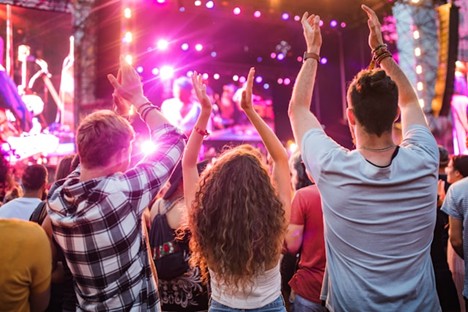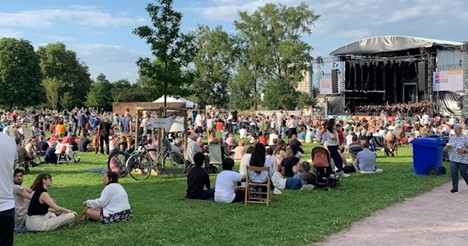
In September, Philadelphia’s Benjamin Franklin Parkway will once again come alive with the sounds of music as the Made in America festival makes its highly anticipated return. Known for its world-class performances, vibrant atmosphere, and cultural significance, the festival is one of the city's most prominent events, attracting tens of thousands of visitors from across the country and around the world. However, Made in America is more than just a music festival - it plays a crucial role as an economic and cultural driver, providing a substantial boost to local businesses, tourism, and job creation in Philadelphia.
Since its inception in 2012, this event has not only become a staple of cultural importance but also an economic powerhouse, generating millions of dollars for the region. From supporting local hotels and restaurants to creating job opportunities, the festival is vital in stimulating Philadelphia's economy. And for festival-goers, it’s not just about the music; many take the opportunity to explore the city’s rich culinary offerings, including stopping by to enjoy the best cheesesteaks in Philadelphia after a day of performances. Here’s a closer look at how Made in America contributes to the local economy and the lasting benefits it brings to the city of Philadelphia.
Each year, as the festival draws crowds to Philadelphia, it brings a significant amount of economic activity to the city. A key component of the city’s tourism and hospitality sectors, the event generates millions of dollars in direct revenue for hotels, restaurants, and local retailers. Over the years, studies have shown that Made in America generates approximately $180 million in economic impact, providing a clear picture of how important the festival is for Philadelphia’s economy.
While the festival takes center stage, it also generates a ripple effect, benefiting other local businesses. This influx of visitors results in increased sales and profits for restaurants, shops, and local attractions that cater to the large crowd of festival-goers, artists, and their families. For small businesses that rely on foot traffic or tourism-related services, the festival offers a significant boost, helping to fuel a year-round economic cycle.
One of the most immediate and noticeable impacts on the local economy is its effect on Philadelphia’s hospitality industry. Traditionally, Labor Day weekend is a slower period for the city’s hotels, as summer tourism winds down. However, the festival has transformed this period into a bustling and profitable time for the hospitality sector.
Hotels across the city report a significant spike in occupancy rates, with many properties seeing near-full bookings. For example, hotel revenues during the festival weekend have been shown to increase dramatically, with many establishments seeing a sharp increase in the demand for rooms. Given the popularity of the festival, some hotels even offer exclusive packages for festival-goers, catering to the large number of visitors coming to the city for the event.
The demand for accommodations not only boosts hotel revenue but also results in a boost for ancillary services, such as transportation, event planning, and local tours. Rideshare services, taxis, and private car rentals all experience increased usage, helping to create additional economic opportunities.
As tens of thousands of people descend on Philadelphia for this event, local restaurants, cafes, and bars experience a surge in business. From food trucks parked near the venue to sit-down dining experiences in Center City, the city’s culinary scene benefits greatly from the festival. Restaurant owners often report increased sales during the festival weekend, and bars and lounges also see a jump in business as attendees seek places to eat, drink, and socialize.
The event also provides a platform for local vendors and artisans. As the festival grounds host a variety of food, art, and merchandise vendors, many local small businesses gain the chance to showcase their products to a broader audience. This opportunity for exposure can translate into long-term customer relationships and future sales.
Retailers also see a boost, with many visitors shopping for souvenirs or essentials during their stay. From branded festival apparel to local artisanal crafts, the festival creates a marketplace for both local and visiting merchants, fostering a spirit of community and commerce.
The Made in America festival creates a variety of employment opportunities, benefiting not only event staff but also local workers and job seekers. The demand for temporary workers - ranging from security personnel to event coordinators - often results in an influx of jobs in Philadelphia during the festival. For many, this temporary employment provides a valuable source of income, especially for those in the hospitality and event management industries.
Moreover, the skills and experience gained from working at such a large-scale event can help individuals build careers in event planning, entertainment, hospitality, and tourism. Some of these temporary jobs can even transition into permanent positions, offering individuals long-term career opportunities.
The festival also encourages the development of a specialized workforce with expertise in areas such as customer service, production management, security, and marketing. These workers are an essential part of the event’s success and contribute to the city’s growing reputation as a hub for cultural and large-scale events.
Made in America isn’t just about the local economy, it also contributes to elevating Philadelphia’s profile on the world stage. By attracting internationally renowned artists and drawing a global audience, the festival garners media attention and increases the city’s visibility. This can have long-term effects on tourism, encouraging international visitors to explore the city in the future.
Beyond tourism, the festival’s success has a positive impact on other areas of the economy, such as real estate and local infrastructure. The increased demand for housing during the festival often stimulates the city’s housing market, while the overall success of Made in America demonstrates Philadelphia’s ability to host large-scale events.

As Made in America prepares for its 2025 edition, the festival promises to continue driving growth and fostering a positive economic impact for Philadelphia. The event has already established itself as a must-see destination for music lovers, and its continued success will undoubtedly benefit local businesses, residents, and the economy as a whole.
In the coming years, the Made in America festival will continue to serve as a vital contributor to Philadelphia’s economy by creating jobs, supporting small businesses, and attracting visitors from around the world. As the city grows and evolves, it will remain a symbol of Philadelphia’s vibrancy, creativity, and resilience.